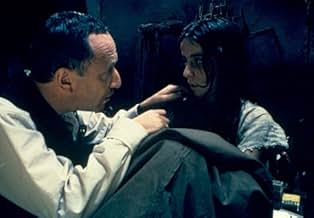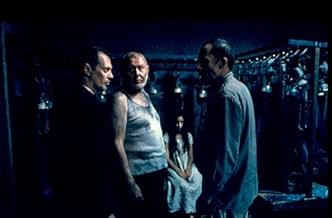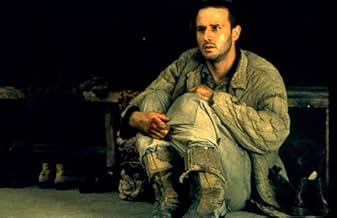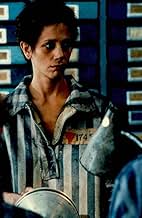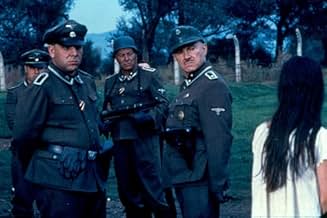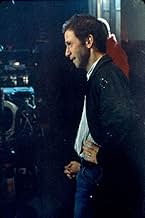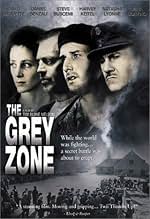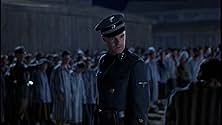Aggiungi una trama nella tua linguaA Nazi doctor, along with the Sonderkommando, Jews who are forced to work in the crematoria of Auschwitz against their fellow Jews, find themselves in a moral gray zone.A Nazi doctor, along with the Sonderkommando, Jews who are forced to work in the crematoria of Auschwitz against their fellow Jews, find themselves in a moral gray zone.A Nazi doctor, along with the Sonderkommando, Jews who are forced to work in the crematoria of Auschwitz against their fellow Jews, find themselves in a moral gray zone.
- Regia
- Sceneggiatura
- Star
- Premi
- 1 vittoria e 3 candidature totali
- Lowy
- (as Georgy Zlatarev)
- Anja
- (as Lisa Benavides)
- Woman Inmate
- (as Dafina Katzarrska)
Recensioni in evidenza
An unthinkable,unconscionable deal has been worked out between a certain group of Nazi death camp inmates and their captors: in order to avoid the ovens(in all likelihood,only temporarily),these inmates would use their talents(among them,musical) to placate and ease along the funneling of other Jews and "undesirables" into the death chambers. A strong cast and an even stronger screenplay/script is augmented by very intelligent cinematography. Particularly good turns by David Arquette,Steve Buscemi,Daniel Benzali and Mira Sorvino as the inmates,all desperate,all convinced of what they have to do to survive and in Arquette's character's case,not even certain if it is even worth it.
It would be tempting to slam "Schindler's List" after seeing this,but I won't. SL is meant as an epic,a tribute,a story of the upside of surviving through the most dense of human tragedy,whereas GZ is a decidedly darker exploration of what happens to people in the same situation but are pushed into much less noble,much more selfish and desperate devices. Both are strong examples of the genre,but where GZ triumphs is that that it explores the most damning actions through the consciences of people faced with decisions that nobody should have to make. It is an unflinching portrait of a dark chapter in human history,rife with detail and completely lacking of lecturing. THis film is for anyone who wants to see an unvarnished and stark portrayal of the human condition brought to its lowest denominator. A must-see for college classrooms and Holocaust museums anywhere!
Good cast with Harvey Keitel, Mira Sorvino, Steve Buscemi and an impressive performance for a change by David Arquette. Arquette chose a very serious role-a Jewish prisoner at a Nazi concentration camp and played it off well.
This is based on a true story about a group of Jewish concentration camp inmates at Auschwitz that plan on smuggling in dynamite to blow up one of the crematoriums. Their plan gets discovered by the SS and killings and torture run rampant to try and get them to confess and give details of their plans.
A teenage girl happens to survive one of the gassings and the camp inmates become obsessed with saving her, even though it could be at the expense of many lives.
There were some people that saw this movie because they couldn't get in to see "Frida". Some people had no idea what this movie was about before they saw it. Some people asked me before it started and I told them and they still chose to stay. If you are a history buff and like Holocaust movies and want to see a true story told through the eyes of the writers, you might like this movie but be prepared to see endless killings working around a decent script that could have been better written. However if you can appreciate the fact that the makers are trying to educate people on the Holocaust and bring to light just how cruel and horrible Hitler's Third Reich was, the movie is sad, depressing, but does have some educational value. Not every single Jew willingly accepted what was going to happen to them, a few tried to rebel and that's why this story was told.
Not very easy on the eyes, bring the Kleenex and watch with shock as one of history's most horrible atrocities is brought to the screen.
7/10.
There are several reasons you must see this film. First, it is based on the diary of Dr. Miklos Nyiszli, a Hungarian Jew chosen by Josef Mengele to be the head pathologist at Auschwitz. And it dramaticizes the true attempt by Sonderkommandos to destroy the Auschwitz gas chambers.
Second, it focuses on ethical dilemnas faced by Dr. Nyiszli and the various Sonderkommandos who are trying to save themselves, their families, or ... just someone ... anyone. To say that these men were "co-opted" by the Nazis is to ignore the horror of the coercion, debasement and dehumanization that the Nazis inflicted -- not only on their prisoners, but upon themselves. One can imagine that some Sonderkommandos were selfish -- just as some Kapos were cruel and some doctors who assisted the Nazis were accomplices. But the question remains -- what would you have done in the face of such coercion and duress?
Third, the film -- based on Tim Blake Nelson's play -- is not the typical Holocaust film. There is very little redeeming behavior. There is no uplifting ending. The grey zone of moral ambiguity is presented as a cold, unfeeling, horrifying place -- where you are damned if you do, and damned if you don't -- which means that they are all damned! For the first third of the film, the script is obtuse, confusing, and disconnecting -- as it should be, considering that we may as well be taking the point of view of someone who just arrived on a train and entered the gates of hell. How can any of this make sense? In the opening scene, the Doctor is asked to save the life of a Jew who attempted suicide. How absurd can that be -- to save the life of someone who will sooner rather than later be murdered by the Nazis anyway?!
In conclusion, the play/film contains dialogue and scenes that are memorable. This is one of my favorites. One Jewish leader is demanding that they destroy the gas chambers as soon as possible. But another Jewish leader is still planning on escape, arguing that he has every right to expect to live. The first leader replies, something to the effect that, after what he has seen and done, he does not want to live!
Today is Holocaust Memorial Day, April 18, 2004. Last night, after seeing a Holocaust documentary on Kurt Gerron ("Prisoner of Paradise") a friend of mine asked me what I would have done? I told her that it would depend on whom I was caring for -- my wife and my daughters -- my parents. It was then that I realized that I would have probably done everything that every Jew did during the Holocaust. I would have tried to save myself and my family. I would have abandoned others -- even betrayed others. I would have killed. I would have fought the Nazis. And I would have probably been killed for it. I would have despaired -- tried suicide -- become depressed, useless to everyone. I don't think I would have survived. I think the only question in that regard -- and it shows how irrelevant the question really is -- is "how soon would I have died." That is why I remember Holocaust Memorial Day -- so that I will never forget -- and I can help work towards a time when such a hell will not occur in Europe, in Africa, in the Middle East, in the US, ... anywhere.
Lo sapevi?
- QuizWriter and Director Tim Blake Nelson made Dr. Miklos Nyiszli's memoirs "Auschwitz: A Doctor's Eyewitness Account" (1946) mandatory reading for the film's cast, along with Primo Levi's "The Drowned and the Saved" (1986) and Filip Müller's "Eyewitness Auschwitz" (1979).
- BlooperAfter the men set the crematoria 4 on fire they tore down the fences and fled into the woods. They barricaded themselves in a barn where SS caught them. They were burned alive inside the barn.
- Citazioni
Hoffman: I used to think so much of myself... What I'd make of my life. We can't know what we're capable of, any of us. How can you know what you'd do to stay alive, until you're really asked? I know this now. For most of us, the answer... is anything. It's so easy to forget who we were before... who we'll never be again. There was this old man, he pushed the carts, and on our first day, when we had to burn our own convoy, his wife was brought up on the elevator. Then his daughter... and then both his grandchildren. I knew him. We were neighbors. And in 20 minutes, his whole family, and all its future, was gone from this earth. Two weeks later, he took pills and was revived. We smothered him with his own pillow, and now I know why. You can kill yourself. That's the only choice. I want them to save you. I want them to save you more than I want anything. I pray to God we save you.
- ConnessioniFeatured in WatchMojo: Top 10 Holocaust Films (2014)
- Colonne sonoreRoses from the South Op. 388
(1880)
Composed by Johann Strauss (as Johann Strauss)
Orchestrated and arranged by Jeff Danna and Andrew Lockington
Performed and conducted by members of the Bulgarian Symphony Orchestra
I più visti
Dettagli
- Data di uscita
- Paese di origine
- Sito ufficiale
- Lingue
- Celebre anche come
- The Grey Zone
- Luoghi delle riprese
- Aziende produttrici
- Vedi altri crediti dell’azienda su IMDbPro
Botteghino
- Budget
- 5.000.000 USD (previsto)
- Lordo Stati Uniti e Canada
- 517.872 USD
- Fine settimana di apertura Stati Uniti e Canada
- 24.526 USD
- 20 ott 2002
- Lordo in tutto il mondo
- 621.592 USD
- Tempo di esecuzione1 ora 48 minuti
- Colore
- Mix di suoni
- Proporzioni
- 1.85 : 1
Contribuisci a questa pagina



